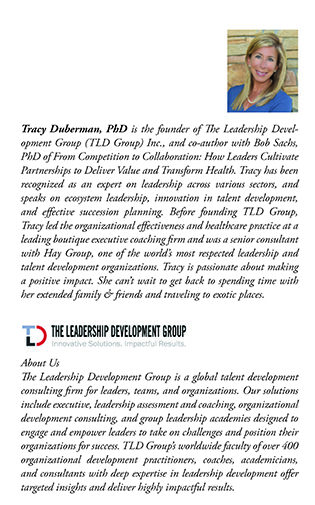Reimagining what, how, and where work gets done — implications for leadership and talent development
By Tracy Duberman, PhD, President and Founder of The Leadership Development Group
The global pandemic has changed the very nature of work. We have been forced to accelerate our adoption of new technologies and escalate new types of work and working relationships. As a result, we are facing myriad challenges including how to engage and empower leaders and teams in new and different ways. We strongly believe leaders have an unprecedented window of opportunity to shape what ultimately becomes the Future of Work.
THE FUTURE OF WORK ENCOMPASSES CHANGES IN WORK, THE WORKFORCE, AND THE WORKPLACE
Changes in Work
The rapid way in which we have embraced new technologies, such as digital platforms and AI supported work, has shifted the very nature of work from task completion to problem-solving. Repetitive and routine tasks continue to be shifted to technology, leaving the more advanced work of problem-solving, communication, listening, interpretation, and design to the workforce.
As the work people do becomes less routine, roles will need to be redefined in ways that marry technology with the workforces’ advanced expertise in interpretation. Techniques such as design thinking will become even more important. Organizations will need to define roles that incorporate the new types of capabilities, skills, activities, and practices in sense-making.
To make all of this happen successfully, we will likely need to change the way we conceive work and develop the training our workforce needs to take on these new roles and assignments. Otherwise, we could find ourselves weighed down trying to apply legacy concepts and skills onto the new and quickly emerging world of human-machine collaboration.
Changes in the Workforce
The ability to create diversity, inclusion, and belonging among the workforce is more pressing than ever. Organizations now have a broad continuum of options for finding workers, from hiring traditional full-time employees to independent contractors and gig workers. These newer workforce types are growing in number and are available to solve problems, get work done, and help leaders build more flexible and nimble organizations.
Organizations have an opportunity to optimize the organizational benefits of each type of talent relationship, whether full time or some other alternative, while also providing meaningful and engaging options for a wide variety of workers’ needs and motivations. To make the most of these opportunities, talent models need to match people’s motivations and skills with the organization’s work needs.
Leaders will need to understand how to tap into “on demand” capabilities and skills from both internal and external sources. Leaders will also need to provide employees and teams with the broadest and most meaningful range of development that are integrated into the flow of their work, careers, and personal lives. Lastly, leaders will have to design new ways to interact with and support the workforce, business teams, and partners to build compelling relationships.
Changes in The Workplace
Where once physical proximity was required for people to get work done, the pandemic hastened the adoption of new and improved digital communication and collaboration platforms creating the opportunity for more distributed teams. We envision organizations orchestrating a range of options as they reimagine workplaces, from the more traditional co-located workplaces to those that are completely dispersed and dependent on virtual interaction.
Changing the physical workplace should not be seen simply as an opportunity to increase efficiency or to reduce real estate costs. Workplace culture is highly connected to both innovation and business results, and as teams become more distributed, organizations need to rethink how they foster both culture and team connections.
The importance of fostering engagement through connections cannot be understated. For leaders, this implies a need for more explicit attention to creating connections and community as workplaces become more virtual and filled with more contingent workers.
IMPLICATIONS FOR LEADERSHIP AND TALENT DEVELOPMENT
We can choose to use the lessons learned during the pandemic, those that forced adoption of new technologies, changes in how we define the workforce, and where we do work to drive more efficiency and cost reduction, or we can consider more deeply the ways to harness these trends and increase value and meaning for our organizations, our employees, and our customers.
Leaders can create a preferred future of work. Engaging and empowering new ways of work, new types of work, and new work delivery models require leaders to:
- Create Meaning: The future of work needs to reach beyond cost and efficiency to include value and meaning. Whether working virtually or in person, leaders need to spur creativity, innovation, and meaning by intentionally building culture and community.
- Focus on Results: The future of work needs to embrace virtual technologies, alternative talent sources, and collaborative workplaces to empower individuals, delegate effectively, and focus on the right results. Leaders need to embrace an ownership culture that supports flexible thinking and prioritizes value of work over volume of activity.
- Develop Diverse Talent: The future of work requires leaders who foster diversity, inclusion, and belonging. Given new ways of work, new types of work, and new work delivery models, focused attention needs to be applied to rebuild the ‘new normal’ in a way that incorporates the type of systemic changes required to thrive in the future.
- Support Collaboration: The future of work requires planned collaboration. Leaders need to be aware that more remote work can lead to elongated working hours, meeting fatigue, and missed in-person connections like spontaneous hallway conversations that can bond a team and make collaboration feel easier. At the same time, remote work has established a level playing field among teammates which is a condition for successful collaborations.
As an organization we at TLD Group strongly believe that leadership plays a pivotal role in creating the future of work, and we are committed to being a part of the design

